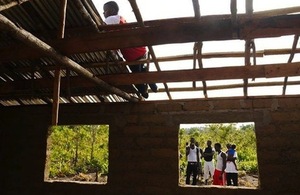DFID Sierra Leone spends nearly £70m in 2013-14
Figures released by the UK Department for international Development (DFID) confirm the UK’s position as Sierra Leone’s leading bilateral donor to help reduce poverty in Sierra Leone.

DFID funded work in Sierra Leone
Figures released by the UK Department for international Development (DFID) confirm the UK’s position as Sierra Leone’s leading bilateral donor, spending £68.6m (USD 115m) in the UK financial year 2013-14 to help reduce poverty and put Sierra Leone on a sustainable development footing.
Of this budget, over half (£40m) was spent on programmes to improve human development outcomes such as education, water & sanitation hygiene (WASH) and health; just over a quarter (£18m) was spent on good governance and access to security and justice programmes; and almost £10m was spent on economic development programmes, such as strengthening public financial management, revenue collection, promoting private investment and creating jobs and new businesses.
DFID channels its funds for Sierra Leone through a variety of mechanisms. In 2013-14, about £15m was provided directly to the Government of Sierra Leone (known as ‘budget support’), enabling the government to pay for basic recurrent costs such as teacher and health worker salaries, and medicines. Over half of DFID’s budget (£39m) went through multilateral channels. This means a significant proportion was spent on programmes implemented by UNICEF, UNFPA, UNDP, the African Development Bank and the World Bank, often pooled with funding from other donors. Over £5.5m went through NGOs such as Oxfam and Save the Children; and finally, just over £7m was spent through private sector contracts, mainly to organisations which provide technical expertise for reform initiatives.
Internationally, the UK has a strong commitment to achieving specific measurable results through its aid programmes. In Sierra Leone, DFID’s work in 2013-14 has achieved: over 1 million people now having access to improved water and sanitation facilities; over 50,000 births delivered by skilled health personnel; almost 40,000 women using a modern method of family planning for the first time; almost 300,000 more women and girls with improved access to security and justice; and over one fifth of remote communities now having access to mediators and paralegal services.
Earlier this year, DFID played a leading role in the development of a Mutual Accountability Framework, setting out mutual commitments of both the Government of Sierra Leone and development partners, to deliver the Government’s development plan - the “Agenda for Prosperity”. This marked a milestone in the country’s post-conflict recovery, putting in place a new, more business-like relationship between Sierra Leone and the international community, in line with the commitment made by Sierra Leone to be one of seven pilot countries for the implementation of a “New Deal for Engagement in Fragile States”. On 18th – 19th June, Freetown will host a global meeting on the New Deal to look at progress made and ongoing challenges for fragile and conflict-affected countries in moving from fragility to resilience.
Next week the UK’s International Development Committee will be visiting Sierra Leone as part of their inquiry into Recovery and Development in Sierra Leone and Liberia. This cross-party parliamentary select committee, which has responsibility for monitoring the policy, administration and spending of DFID and its associated bodies, will be looking at DFID’s programmes and meeting its programme partners in order to compare and contrast Sierra Leone’s development path following the civil war. A final report will be published in the autumn.
More information about DFID programmes and spending priorities in Sierra Leone and globally can be found at http://devtracker.dfid.gov.uk/ - an online tool that enables UK government transparency about all of its aid spending in developing countries
Further Information
• DFID is committed to the transparency of its funds and fully endorses the International Aid Transparency Initiative (IATI) Standard. More information can be found at: www.aidtransparency.net/
• DFID Sierra Leone & Liberia works in close collaboration with other UK Government colleagues on the ground, particularly with the Foreign & Commonwealth Office (FCO) and Ministry of Defence (MoD). More information can be found at: www.gov.uk/government/world/sierra-leone
The Department for International Development (DFID) We lead the UK government’s work to end extreme poverty. Find out more at www.gov.uk/dfid
Contact our Press Office: 020 7023 0600 (Overseas +44 20 7023 0600) Get our latest press releases, free-to-use photos, embeddable videos and case studies online For breaking news, follow us on Twitter: @DFID_Press